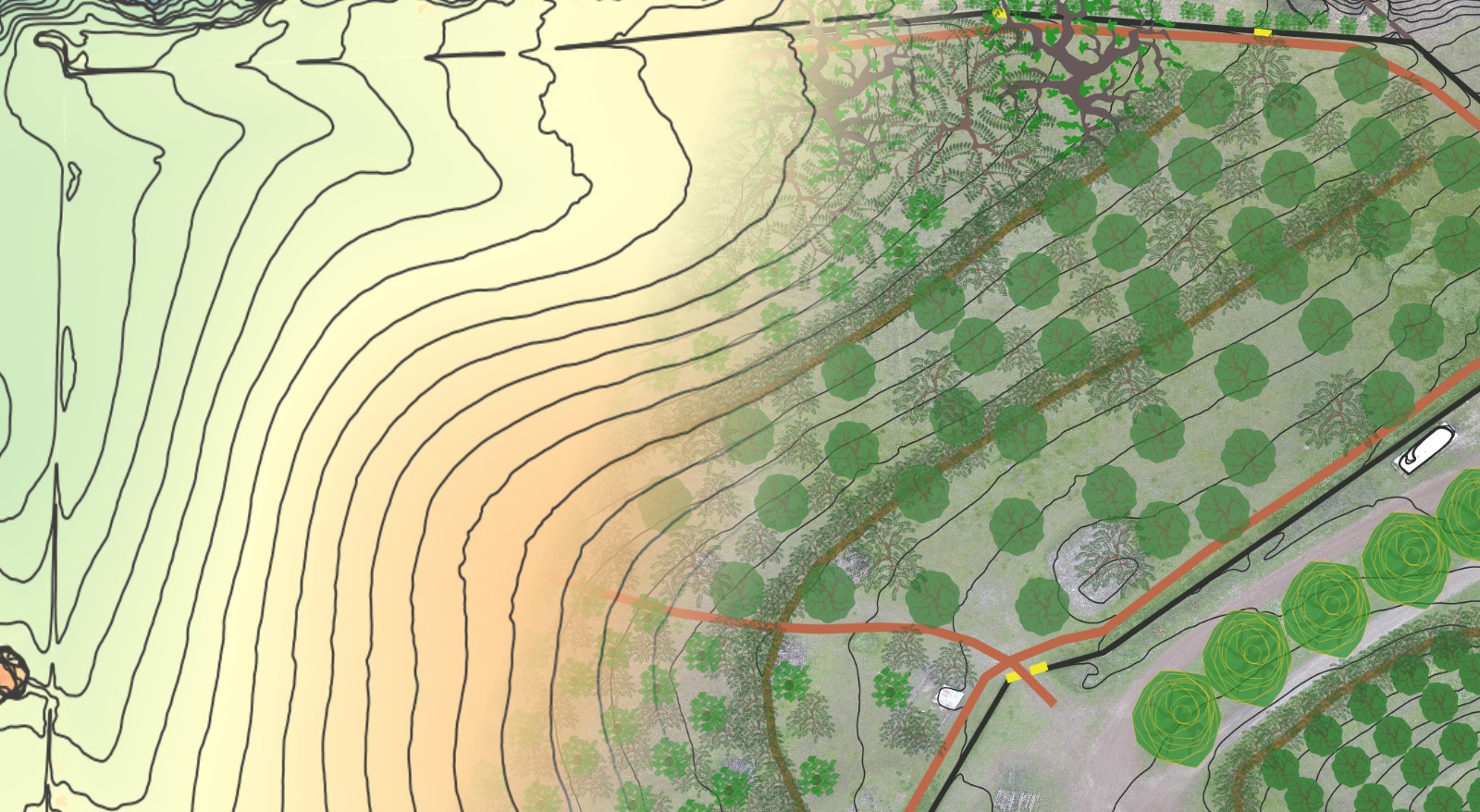
Mainframe Design
Location: Temecula, CA
Land & Climate Characteristics: The 18.9 acre property features 6.4 acres of mature avocado orchard, 3.8 acres of juvenile olive orchard and .8 acres of vineyard. Over 1,100 feet of De Luz Creek flows year round through the property, bisecting it into two sections. The creek is bordered by oak woodland and some remaining chaparral sections. The entire property was covered in native CA chaparral until 2002, when over 80% of it was scraped bare in preparation for planting avocados, which was completed in 2005. Topsoil loss from this initial clearing, as well as the later removal of half the avocados (due to Phytophthora root rot) was severe and remedying it was a main focus in formulating the dryland agroforestry systems proposed for retrofitting the olive and vineyard areas.

Client’s Vision and Goals: The clients envision creating an abundant homestead that can nourish their family and surrounding community for generations to come by creating a place where people, animals, plants, and insects can express their fullest innate potential. They wish to build literal and metaphorical soil by living in connection with nature and providing a lived example that will inspire their close relations to take similar steps in their own lives. You can follow their continuing journey on Instagram @fabledoaksfarm.

Mainframe Design Elements
- Water
- Passive water harvesting earthworks to capture road and property run-off (formerly contributing to creek flooding) and infiltrate it to irrigate dryland agroforestry cropping areas.
- Re-patterning of active rainwater harvesting system overflow to halt inbound erosive flows, additional rain water storage for greater water resilience.
- Erosion control plantings with vetiver grass and earthworks where erosion is actively happening.
- Access
- Additional vehicle access to permit truck and trailer access to future livestock housing areas without having to turn around.
- Shelter
- Siting and orientation for future equipment barn and ranch headquarters building.
- Living Systems
- Climate-appropriate plantings to maximize the biological benefit from additional water infiltration in the form of biomass.
- Perennial cover-cropping of bare soils to reduce erosion and increase fertility.
- Diversification of existing monocrop plantings into multi-layered systems that increase overall production, restore healthy ecological function and reduce input costs.
- Management of broad-acre areas with livestock to improve soil fertility (and thus plant health) and provide food for the family and community.
- Recommendations for wild-tending the riparian zone into a forager’s paradise while also enhancing it’s beauty and ecological integrity.


Design Map Call Outs
Water Harvesting Earthworks Implementation
Implementation Scope: Mainframe passive water harvesting earthworks as specified in the Mainframe Design in early February of 2021. The earthworks included…
Elements Implemented
- ~950 linear feet of swale spread over four separate swale lines, with a combined bank full capacity of ~ 17,200 gallons.
- A geologically-armored pick up drain that can be “turned on” with ~5 sandbags to direct run-off from the roadside drain (where it would normally run right by the property) into the swale system. This feature alone will put an additional 150,000 gallons of water per year into the soils at Fabled Oaks Farm – simultaneously alleviating storm flow surges and improving base flow in De Luz Creek.
- Seven geologically-armored flow transitions – energy dissipation pools, armored sills, media lunas, splash basins and knitted rock mulch rundowns.
- Two rolling dips where water is transitioned over existing driveway surfaces in a non-erosive fashion. Rolling dips enable overland water flow across a road surface while also maintaining 4-season driveability and a high speed of vehicle travel.
- This system is estimated to infiltrate between 750,000 and 1.5 million gallons of precipitation that would have previously run straight off the property or passed by it on the road surface during a typical rain year.
Earthworks Implementation Gallery
Video Walkthrough Of Completed Passive Water Harvesting System
Day-by-Day Implementation VLOG
First Rain Event Pick Up Drain Operation
























